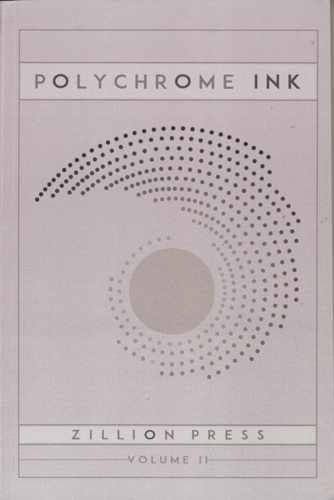Polychrome Ink – October 2015
For Polychrome Ink, the goal is simple: prove that “diversity is not a niche market.” The contributors and their content exhibit diverse sexuality, gender, religion, race, ability, and more. The authors featured dig into the intersection of power and vulnerability to tell stories where people are diverse, but most importantly: where people are people. For Polychrome Ink, the goal is simple: prove that “diversity is not a niche market.” The contributors and their content exhibit diverse sexuality, gender, religion, race, ability, and more. The authors featured dig into the intersection of power and vulnerability to tell stories where people are diverse, but most importantly: where people are people.
Most pieces in Polychrome Ink place us in the shoes of a marginalized person to spark empathy regardless of our differences. But J. Lee Ellorris’s prose-poem “Destruction” places us in the mind of an abuser. We do not wish to empathize with a narrator who describes their sexual desire as love and hate at once. Ellorris’s violent verbs describe the need “to rake my knuckles down your skin, to crush you close.” The horror stems from the narrator’s philosophy that love and hate are a single means of power. “I read somewhere that the desire to touch adorable things, precious things, comes from the same place as aggression.” Even as the narrator reveals their vulnerability and need to touch, “you” is described as a thing: the object of emotions. And while we do not wish to understand these desires, the narrator remains unflinchingly human with a wish for power, love, and control.
Cindy E. King writes about control over appearance, focusing on gender and a high school prom. Her poem “Girl in Sheep’s Clothing (1989)” begins with the gym: “Free of fouls and free throws, sprints and suicides.” Her language evokes freedom from normalcy and couples it with the disturbing language of death. At the prom, the narrator courts freedom and gender non-conformity by dressing in a suit. Male clothing becomes the discussion of gender-presentation. They have “slipped on this sex / one leg at a time”; they are “drunk on aftershave.” They remind their mother, “I can tighten the knot at my throat on my own” referencing ties, while also hinting at suicide. King balances elation with an undercurrent of fear to discuss the complexity of gender identities.
In the poem “Check One,” Vincent “Subversive” Perez strikes a balance between formal white language and the rhythmic language of his Black and Mexican heritage. Perez’s poem tells the story of when he was forced to check the box (singular) of his race. The first half of the poem utilizes white language, written in awkward chunky sentences: “I’ll never forget the first time I took an in school survey.” In the second half of the poem, Perez displays his power in his biracial identity, through word play and rhythm: “We can’t get ‘then’ back cause our skin’s black / And I can’t get then back cause my skin . . . ain’t.” The rhythm and subverted repetition are more natural than the first stanzas of the poem, which were purposefully written in a language not his own. Perez demonstrates authority over his heritage as well as his fight to claim and share his identity.
“Mr. Chinese Right,” a fiction piece by Cathy Adams, felt the most self-aware in the journal because Adams crafts fictional characters who are more than a single diverse trait. Nadine is a naïve, well-intentioned woman who exoticizes Asian men. She’s racist and doesn’t know it. Then Nadine meets Angus, a Chinese-American man who deconstructs Nadine’s casual racism. While watching a Jackie Chan film, Nadine asks, ‘“Are you a big Jackie Chan fan?”’ and Angus responds, ‘“You mean I’m Asian, so I should like his movies. Right?”’ and he continues about all the ways he’s a real person in addition to being Chinese. All the while, Angus comes to a new understanding of what being Chinese means for him as the child of immigrants. This story delves into casual racism and empowers characters of color to question themselves and drive their own stories.
Polychrome Ink delivers on being a publication celebrating diversity. The poems and stories reflect the experiences and lives of people of color, queer people, differently abled people, and others. Whether by writing about their own lives, featuring a multiplicity of identities in their work, or depicting a neglected point of view, the contributors create a publication of empathy. The stories and poems feature complicated individuals who hold power even under oppression. They are ultimately us no matter what identities we hold.
[www.zillion-press.com/polychrome-ink]





